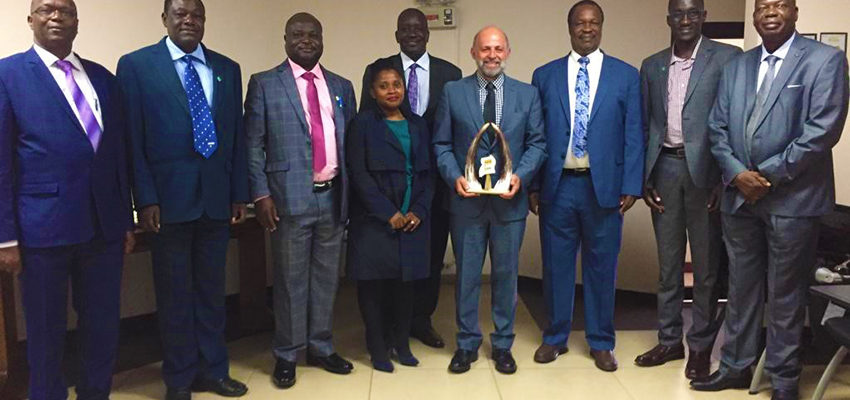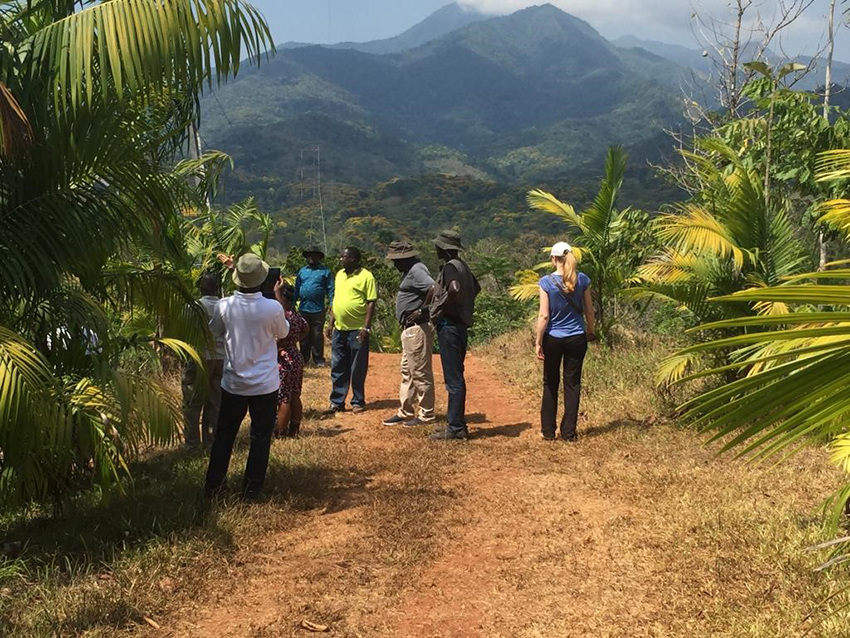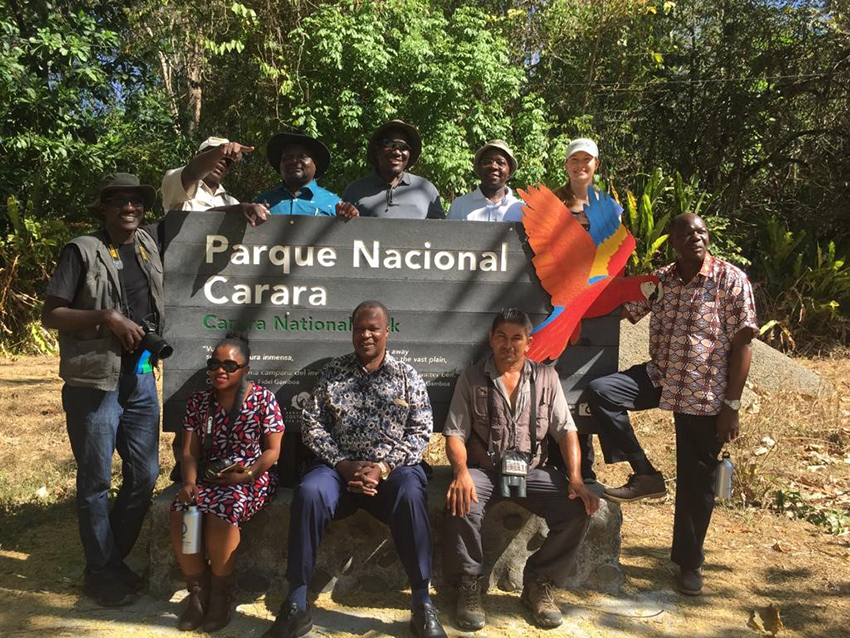CBIT -Uganda participates in the validation of the first biennial update report
CBIT- Uganda PMU joined technocrats from government Ministries departments and agencies to validate the first biennial update report (BUR1).
The 5-day validation meeting took place at Ridar Hotel Mukono from 17th to 21st June, 2019. It was hosted by the Climate Change Department (CCD), Ministry of Water and Environment. Participants in the 5-day meeting were from the Africa Innovations Institute, Ministry of Agriculture Animal Industry and Fisheries, National Forestry Authority, National Agricultural Research Organization, Ministry of Trade and Industry, Ministry of Energy and Mineral Development, Ministry of Local Government. The technical backstopping of the meeting was by BUR (Biennial Update Report) Task force members.
The aim of the validation meeting was to ensure that information and data shared in the draft BUR1 is a good representation of the ‘reality’ within the sectors that were represented and to discuss constraints and gaps. Each of the sectors was allocated a day for discussion; with only waste and industrial processes and product use (IPPU) sharing a day.
BURs are to be submitted by non-Annex I Parties to the United Nations Framework Convention on Climate Change (UNFCCC) once every two years. Their purpose is to provide updates on actions undertaken by a Party in implementing the convention. The report also provides updates on national GHG inventories; constraints and gaps in climate action and support needed and received.
Participants in the meeting were informed that Uganda was committed to submitting her BUR1 before the end of June 2019.
CBIT Uganda will use the findings of this meeting to support capacity building in the forthcoming project activities such as training on GHG inventory and reporting
‘Leave no one behind in the fight against climate change’-AfrII’s plea to Uganda’s leadership.

AfrII Chairman, Prof. George William Otim-Nape addresses climate change experts during the CBIT Project workshop at Hotel Africana.
“We are doing something but not enough. Uganda is losing close to 200,000 hectares of forest every year. This situation is thus quite worrying because it exposes a high rate of deforestation in the country. Years from now we shall have no forests, no rain, no water. Hence, this country needs high level committed leadership in environmental conservation to fight climate change. It needs innovative interventions and really serious and committed leadership where everybody is mobilized to own the fight against climate change. Imagine if there was a law saying “each person living in Uganda must plant a tree on his or her birthday. Or if it said, ‘On every wedding anniversary, plant a tree. How many trees would be planted in a day?” And, if we do this consistently for 10 years, we will have contributed a great deal to climate action.” –AfrII Chairman, Professor George William Otim-Nape.
He urged everybody to get on board and actively join the fight against climate change. “Let us all have the will and commitment to this. The threats are real, we are experiencing them, and being hit hard, an evident example is the long dry spells the country is currently faced with, the floods and landslides. Therefore, if we do not conserve nature, we will continue to suffer such climate change effects” added Prof. Nape.
He made the remarks at the just concluded National Stakeholders Workshop for the National Green House Gas Inventory (GHG) and Measuring Reporting and Verification (MRV) system under the Capacity Building Initiative for Transparency (CBIT) Project. The event was organized by the Ministry of Water and Environment-Climate Change Department (MoWE-CCD) in collaboration with Conservation International (CI) and the Africa Innovations Institute (AfrII) with aim to;
- Conduct gender awareness and mainstreaming in sector specific climate change activities.
- Share lessons and best practices across sectors in climate action.
- Assess the training, capacity and data management needs in the 5 NDC sectors.
- Revitalize the discussion around the institutional arrangements on data collection, processing and sharing. Role
The Global Environment Facility (GEF) through CI is funding the CBIT Project to support GOU to meet the transparency requirements of the Paris Agreement. CBIT intends to support CCD to strengthen institutional arrangements and build capacity of stakeholders for GHG data collection and processing in 5 key sectors; Agriculture, Forestry, Energy, Transport and Waste.
AfrII launches new project titled “The Capacity Building Initiative for Transparency” CBIT

The Minister of State for Environment passionately calls on all Ugandans to embrace climate action as a responsibility. She made the remarks while launching the CBIT Project at Hotel Africana. Left-Right: Dr. Peter Alele, the Africa Field Director at Conservation International, Prof. G.W. Otim-Nape, the AfrII Chairman, and Dr. Maikut Chebet, Head of Climate Change Department-MoWE. He is also the National UNFCC Focal person.
The Africa Innovations Institute (AfrII) in partnership with the Ministry of Water and Environment (MoWE) is to implement the Capacity Building Initiative for Transparency Project (CBIT) that seeks to “Strengthen Capacity of Institutions in Uganda to comply With the Transparency Requirements of the Paris Agreement.” Uganda is a signatory to the Paris Agreement and is required to provide necessary information to track progress towards implementing and achieving the Nationally Determined Contributions (NDCs) and on reducing Green House Gas (GHG) Emissions.
While launching the CBIT Project at Hotel Africana in Kampala, the Minister of state for Environment, Hon. Kitutu Mary Goretti praised its timing since Uganda is expected to regularly provide among others Information related to climate change impacts and adaptation. The Minister noted that in Uganda, the problem of climate change is negatively impacting the livelihoods of people countrywide and that drastic changes of temperature are predicted to happen as early as 2030, adding that it is now up to Uganda to meet her targets towards the Sustainable Development Goals (SDGs) that have been aligned to the National Development Plan 11. She noted that the recurrent incidents of prolonged drought, hailstorms, landslides and lightening continue to cause misery to several communities. “There have been recent calamities reported in some villages, for example, in my district, I have about 40 households that have been displaced by the recent landslides. We are also on alert of an El Nino that is predicted to soon hit. These are some of the evidences that call for serious climate combat. It should now be everyone’s responsibility to actively get involved and adapt and mitigate on climate change and its impacts.”

Hon. Kitutu acknowledges the projects involvement of women in climate action since she believes that women drive progress.
Furthermore, the Minister decried the continued encroachments to the gazetted reserves by people that do not seem to understand how serious the threat around climate change is. “When we talk about adaptation and mitigation, we are battling with people moving away from wetlands. Uganda’s wetland cover is just at 8% while the natural forest cover is at only 9% but people still want to encroach on these percentages as well. Am very worried of these two eco systems, the central forest reserves and the wetlands. I have to be frank that a lot more has to be done, especially around enforcement. Today, we have areas that are naturally completely dry with no water on the ground and at the surface and in 2016 when we assessed the ground water, we found only 33%. People do not see the importance of us keeping the forests and wetlands and yet forests play a big role to keep water around us. And adding on the persistent climate change issues, it is very critical that we conserve these ecosystems. And so, when you are talking of capacity building around climate change, it is a very welcome idea because capacity is needed for people to understand how important these ecosystems are and why they should not be tampered with. Especially since we are rampantly cutting down trees, I would like to see the impact on some of these because that is a very important area where we need capacity to be built. I hope that this capacity building initiative is going to cause a change and help Uganda meet her commitment to climate action.” She also appealed for more funding to the relevant sectors for these to ably contribute to the NDCs. “When monies are allocated to certain ministries, they are so meagre, for example the Ministry of Water and Environment got only about 3% of the national budget. This should be moved to at least 5%. People are complaining about deforestation but when it comes to budget allocation, the chunk is small. The fight against climate change should go beyond just ‘good speeches’ and therefore, capacity is needed for people to gravely understand these issues. I hope that CBIT is going to achieve the transparency that we need because there is need for more support to the institutions working around climate change adaptation and mitigation.”

The State Minister for Environment Hon Kitutu Mary Goretti signs the CBIT Project document as the AfrII Chairman Prof. Otim Nape (left) and Mr. Chebet Maikut, Head of Climate Change Department and UNFCC National Focal person witness.
The Minister acknowledged the involvement of women through the project and said that women are passionate about human well-being and the environment and will therefore largely contribute to climate action. The CBIT has committed to a 30% women involvement.
Meanwhile, Dr. Felly Tusiime, the Head of the Climate Change and Environment Sustainability Programme at the Africa Innovations Institute(AfrII) said that the Project intends to establish and strengthen the institutional arrangements for a robust GHG emission inventory and MRV system, build capacity of key stakeholders to collect, process and feed gender disaggregated data into the GHG emissions inventory system as well as test and pilot the GHG emission inventory and MRV system.
“We acknowledge that there is already an existent national Green House Gas inventory but this has a lot of gaps related to data and therefore the project aims to strengthen the departments within the Climate Change division at the Ministry of Water and Environment where the inventory exists. We also intend to mainstream gender and strengthen the gender focal points in the different sectors, formalize data collection, processing and sharing it openly to the public.” She added that the project will work alongside five sectors of Agriculture, Forestry, Energy, Transport and Waste, that are extensively affected by climate change and already have MRV plans.

AfrII’s Dr. Felly Tusiime addresses participants on the CBIT project intentions towards Uganda achieving her commitments to the Paris Agreement
Uganda is a signatory to the Paris agreement and is required to provide necessary information to track progress towards her commitment to reduce global emissions by 22% by 2030 and to pursue efforts to limit the global temperature increase even further to 1.5 degrees Celsius through attaining the necessary knowledge, skills and trainings to measure, report and verify the national greenhouse gas emissions. Through CBIT, Uganda presents a great opportunity to fulfil this through strengthening the ability of the country to deal with the impacts of climate change through identification of priority areas for investment.
CBIT is funded by the Global Environment Facility (GEF) through Conservation International (CI) and is pursuing 3 key components; Support establishment and strengthening the institutional arrangements for robust GHG emission inventory and MRV system, build capacity of key stakeholders to collect, process and feed gender disaggregated data into the GHG emissions inventory system and test and pilot the Green House Gas (GHG) Emission Inventory and Monitoring Reporting Verification (MRV) system.






